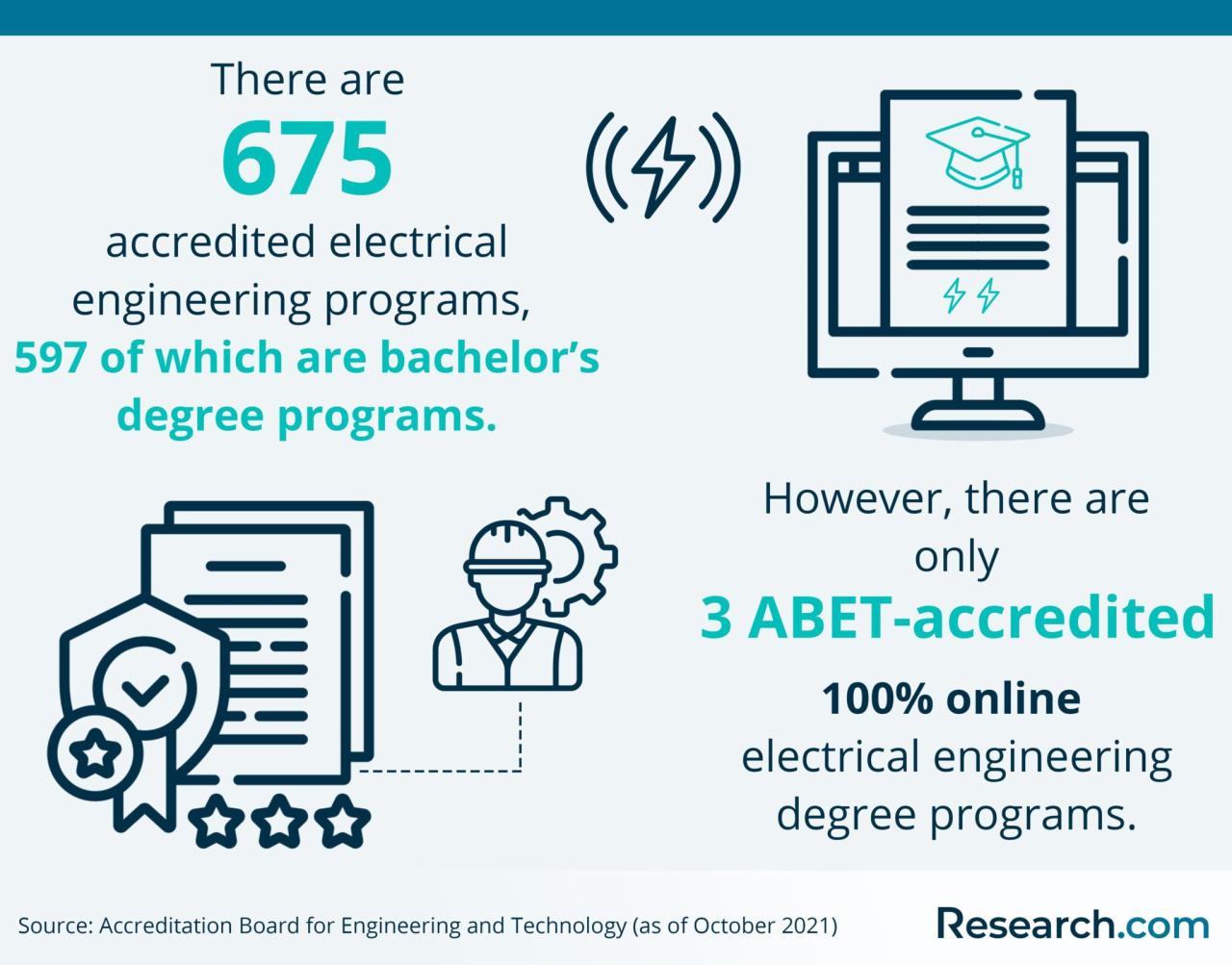Online Electrical Engineering Degree: A Path to Success in the Electrical Industry
In today’s rapidly evolving technological landscape, electrical engineering has emerged as a field of paramount importance, driving innovation and shaping the future. With the advent of online education, pursuing an electrical engineering degree has become more accessible than ever before.
This article delves into the world of online electrical engineering degrees, exploring their benefits, challenges, curriculum, career prospects, and more, providing a comprehensive guide for aspiring electrical engineers.
The online electrical engineering degree offers a flexible and convenient path to higher education, allowing students to balance their academic pursuits with other commitments. With the proliferation of online learning platforms and the expertise of renowned universities, students can access high-quality education from the comfort of their own homes.
Contents
Overview of Online Electrical Engineering Degrees
Online electrical engineering degrees offer a flexible and convenient way to earn a degree in this in-demand field. With the rise of remote work and online learning, these programs have become increasingly popular.
There are several benefits to pursuing an online electrical engineering degree. First, it allows students to study at their own pace and on their own schedule. This is ideal for working professionals, parents, or anyone with a busy lifestyle. Second, online programs are often more affordable than traditional on-campus programs.
Third, online students have access to the same resources and support as on-campus students, including faculty, advisors, and career services.
Of course, there are also some challenges to pursuing an online electrical engineering degree. First, it is important to be self-motivated and disciplined. Second, online students may miss out on the social and networking opportunities that are available to on-campus students.
Third, some online programs may not offer the same hands-on experience as traditional on-campus programs.
Popularity of Online Electrical Engineering Programs
The popularity of online electrical engineering programs has been growing in recent years. According to a 2021 survey by the American Society for Engineering Education, the number of students enrolled in online engineering programs increased by 15% between 2019 and 2021.
There are several reasons for the growing popularity of online electrical engineering programs. First, the COVID-19 pandemic has forced many colleges and universities to offer more online courses and programs. Second, the rise of remote work has made it more difficult for students to attend traditional on-campus programs.
Third, online programs are often more affordable and flexible than traditional on-campus programs.
Reputable Universities Offering Online Electrical Engineering Degrees
There are several reputable universities that offer online electrical engineering degrees. Some of these universities include:
- University of Illinois at Urbana-Champaign
- Purdue University
- Georgia Institute of Technology
- Stanford University
- Massachusetts Institute of Technology
Curriculum and Coursework
Online electrical engineering programs provide a comprehensive curriculum that covers the fundamental principles and advanced concepts of the field. Students can expect to delve into a range of core courses, as well as specialize in specific areas of interest.
The coursework typically includes a strong emphasis on theoretical foundations, practical applications, and hands-on experiences.
Core Courses
- Circuit Analysis
- Digital Systems
- Electromagnetism
- Control Systems
- Electronics
- Signals and Systems
li>Power Systems
Specializations
Many online electrical engineering programs offer specializations that allow students to tailor their education to their career goals. Common specializations include:
- Power Engineering
- Control Systems
- Electronics
- Computer Engineering
- Telecommunications
Hands-on Projects, Labs, and Simulations
In addition to theoretical coursework, online electrical engineering programs often incorporate hands-on projects, labs, and simulations to provide students with practical experience. These activities may include:
- Building and testing electrical circuits
- Designing and simulating power systems
- Developing control systems for industrial applications
- Programming microcontrollers and embedded systems
Faculty and Support
Online electrical engineering programs are led by experienced faculty members who are experts in their respective fields. These professors bring their industry knowledge and research experience into the online classroom, ensuring that students receive a high-quality education.
In addition to faculty support, students also have access to a range of academic and technical support services. These services include online forums and discussion boards where students can connect with classmates and faculty members, as well as technical assistance to help with any technical issues that may arise.
Mentorship and Advising
Many online electrical engineering programs offer mentorship and advising services to help students succeed in their studies. Mentors can provide guidance on course selection, research opportunities, and career planning. Advisors can help students develop academic plans and navigate the administrative aspects of their program.
Career Prospects and Industry Demand

Graduates with online electrical engineering degrees possess a strong foundation in electrical theory and practical skills, making them highly sought after in various industries.
Electrical engineers with online degrees can pursue a wide range of career paths, including:
- Power Systems:Designing, installing, and maintaining electrical power systems for residential, commercial, and industrial buildings.
- Control Systems:Developing and implementing control systems for automation, robotics, and manufacturing processes.
- Electronics:Designing and testing electronic devices, circuits, and systems used in various applications.
- Telecommunications:Working on the design, implementation, and maintenance of telecommunications systems, including wireless networks and fiber optics.
- Renewable Energy:Designing and developing systems for harnessing renewable energy sources such as solar, wind, and geothermal energy.
Salary Expectations and Career Advancement
Electrical engineers with online degrees can expect competitive salaries based on their experience, skills, and industry. According to the U.S. Bureau of Labor Statistics, the median annual salary for electrical engineers was $100,830 in May 2021.
Career advancement opportunities are also available for electrical engineers with online degrees. With experience and additional education, they can move into leadership roles such as project manager, engineering manager, or chief technology officer (CTO).
Cost and Financing
The cost of online electrical engineering programs varies depending on the institution, program duration, and additional fees. Tuition fees typically range from $30,000 to $60,000 for a bachelor’s degree and $20,000 to $40,000 for a master’s degree. Other expenses may include course materials, technology fees, and living expenses if applicable.
Financial Aid and Scholarships
Many universities offer financial aid to eligible students, including grants, scholarships, and loans. Scholarships are typically merit-based and do not require repayment. Grants are awarded based on financial need and do not need to be repaid. Loans, on the other hand, must be repaid with interest.
Students should explore all available financial aid options to minimize the overall cost of their education.
Payment Plans
Most universities offer payment plans that allow students to spread the cost of tuition and fees over several months or semesters. This can help students manage their expenses and make education more affordable.
Cost Breakdown and Financing Options
The following table provides an overview of the cost breakdown and financing options available for online electrical engineering programs:| Cost Component | Estimated Cost | Financing Options ||—|—|—|| Tuition | $30,000
$60,000 | Scholarships, grants, loans, payment plans |
| Course Materials | $1,000
$2,000 | Student loans, personal savings |
| Technology Fees | $500
$1,000 | Student loans, personal savings |
| Living Expenses (if applicable) | $10,000$20,000 | Student loans, part-time work, personal savings |
Final Review
In conclusion, an online electrical engineering degree provides a gateway to a rewarding career in the electrical industry. With its flexible learning format, comprehensive curriculum, and strong job prospects, it empowers individuals to advance their knowledge, skills, and career opportunities in this dynamic field.
Whether you are a recent high school graduate or a working professional seeking career advancement, an online electrical engineering degree can pave the way to a successful and fulfilling future.





